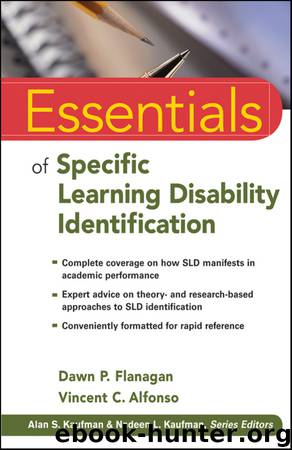Essentials of Specific Learning Disability Identification by Flanagan Dawn P. Alfonso Vincent C. & Vincent C. Alfonso

Author:Flanagan, Dawn P.,Alfonso, Vincent C. & Vincent C. Alfonso
Language: eng
Format: epub
Publisher: John Wiley & Sons, Inc.
Published: 2010-10-24T16:00:00+00:00
Third method pattern approaches that include formal cognitive and neuropsychological assessment make sense given the conclusions drawn by 14 professional organizations that composed the Learning Disabilities Roundtable (LDR; 2002, 2004) advisory panel. They concluded, “[t]he identification of a core cognitive deficit, or a disorder in one or more of the basic psychological processes, predictive of an imperfect ability to learn, is a marker for an SLD” (p. 5; LDR, 2002) and “…also acknowledges intra-individual differences as a fundamental concept of SLD” (p. 13; LDR, 2004).
Third method approaches also make empirical sense given children with brain-based disorders such as SLD and ADHD experience developmental deficits (see Berninger & Richards, 2002; Castellanos et al., 2002; Collins & Rourke, 2003; Fiez & Petersen, 1998; Filipek, 1999; Fine, Semrud-Clikeman, Keith, Stapleton, & Hynd, 2007; Francis et al., 1996; Geary, Hoard, & Hamsom, 1999; Hale & Fiorello, 2004; Naglieri & Bornstein, 2003; Nicholson & Fawcett, 2007; Pugh et al., 2000; Shaywitz, Lyon, & Shaywitz, 2006; Simos et al., 2005; Stein & Chowdbury, 2006; Tallal, 2006), not simply learning delays as RTI advocates suggest (e.g., Barnett et al., 2004). Not only is the pattern of strengths and deficits approach recommended by many SLD researchers and stakeholders, but it is also consistent with the views of representative samples of school-based practitioners (Caterino et al., 2008; Machek & Nelson, 2010) and professional organizations such as the National Association of School Psychologists (NASP; 2007) and American Academy of School Psychology (Schrank et al., 2006; Hale et al., 2010).
Don't Forget
Neuropsychological research clearly shows that children with SLD and other high-incidence disorders have learning deficits, not learning delays; therefore, interventions cannot just be more intensive, they must be individualized.
Download
This site does not store any files on its server. We only index and link to content provided by other sites. Please contact the content providers to delete copyright contents if any and email us, we'll remove relevant links or contents immediately.
The Art of Coaching Workbook by Elena Aguilar(51158)
Trainspotting by Irvine Welsh(21636)
Twilight of the Idols With the Antichrist and Ecce Homo by Friedrich Nietzsche(18620)
Fangirl by Rainbow Rowell(9228)
Periodization Training for Sports by Tudor Bompa(8252)
Change Your Questions, Change Your Life by Marilee Adams(7757)
This Is How You Lose Her by Junot Diaz(6875)
Asking the Right Questions: A Guide to Critical Thinking by M. Neil Browne & Stuart M. Keeley(5757)
Grit by Angela Duckworth(5601)
Red Sparrow by Jason Matthews(5464)
Paper Towns by Green John(5177)
Room 212 by Kate Stewart(5102)
Ken Follett - World without end by Ken Follett(4722)
Housekeeping by Marilynne Robinson(4436)
The Sports Rules Book by Human Kinetics(4379)
Double Down (Diary of a Wimpy Kid Book 11) by Jeff Kinney(4259)
Papillon (English) by Henri Charrière(4258)
The Motorcycle Diaries by Ernesto Che Guevara(4089)
Exercise Technique Manual for Resistance Training by National Strength & Conditioning Association(4060)
